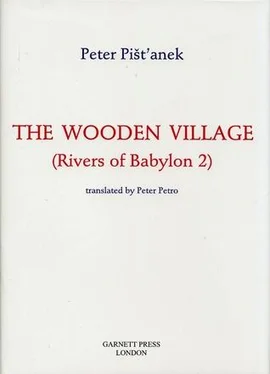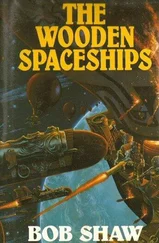Peter Pišťanek - The Wooden Village
Здесь есть возможность читать онлайн «Peter Pišťanek - The Wooden Village» весь текст электронной книги совершенно бесплатно (целиком полную версию без сокращений). В некоторых случаях можно слушать аудио, скачать через торрент в формате fb2 и присутствует краткое содержание. Год выпуска: 2008, Издательство: Garnett Press, Жанр: Современная проза, на английском языке. Описание произведения, (предисловие) а так же отзывы посетителей доступны на портале библиотеки ЛибКат.
- Название:The Wooden Village
- Автор:
- Издательство:Garnett Press
- Жанр:
- Год:2008
- ISBN:нет данных
- Рейтинг книги:3 / 5. Голосов: 1
-
Избранное:Добавить в избранное
- Отзывы:
-
Ваша оценка:
- 60
- 1
- 2
- 3
- 4
- 5
The Wooden Village: краткое содержание, описание и аннотация
Предлагаем к чтению аннотацию, описание, краткое содержание или предисловие (зависит от того, что написал сам автор книги «The Wooden Village»). Если вы не нашли необходимую информацию о книге — напишите в комментариях, мы постараемся отыскать её.
The Wooden Village — читать онлайн бесплатно полную книгу (весь текст) целиком
Ниже представлен текст книги, разбитый по страницам. Система сохранения места последней прочитанной страницы, позволяет с удобством читать онлайн бесплатно книгу «The Wooden Village», без необходимости каждый раз заново искать на чём Вы остановились. Поставьте закладку, и сможете в любой момент перейти на страницу, на которой закончили чтение.
Интервал:
Закладка:
Then comes proud Feri Bartaloš, and the gypsies get their greasy cards out. Feri is an almost obsessive card player. Ever since he’s made some money, he plays like a man possessed. They play poker, and blackjack. Šípoš and Berki are willing partners; to be sure, it is always one of the two gypsies who wins.
The customer is soon finished and emerges from the hovel, buttoning up his fly. Freddy leads him out of the boiler-room and walks him to the Wooden Village, where another customer is now waiting. Freddy takes him over and everything is repeated: ten more crowns in his pocket.
Around lunch-time, Freddy gets his money from Bartaloš and queues for the pork steak Montenegro, ketchup, and a roll. He washes it down with a beer. Eržika queues behind him; she is buying lunch for Lady.
Freddy sits there, sating himself on this delicious food and wishing that those who turned him, an honest businessman, into a despicable criminal could see him. His own suffering moves him so much that he decides to get another beer.
Soon proud Feri Bartaloš comes out of the boiler-room: Lady has had her lunch.
The lunch break is over: another customer is standing by the lavatories, swallowing his saliva with excitement and clutching in his palm a sweaty hundred-crown note.
* * *
For a long time Martin has been putting off his visit to Nová Ves. Nová Ves is the village where his former wife Marfa and his son Oliver live, together with her parents, and where Hruškovič, a friend and a member of Martin’s trio Hurytan, also lives.
In Nová Ves, Martin first visits his former in-laws, telling the taxi driver to wait for him.
The light-blue gate is ajar, as if they were expecting visitors. Martin looks over the fence, but there’s nobody there. He gently pushes the gate open and enters the yard. He looks around. Nothing has changed. Everything looks exactly as it did when he, too, lived here.
There is a bell by the door. Martin pushes the button, but hears no sign that the bell works. Martin tries one more time, but he can’t hear a bell, or any other sound. He presses the handle and opens the door.
“Good morning!” he shouts cheerfully with a tinge of servility in his voice, but nobody answers.
Martin becomes bolder and enters the hall. First he glances to the right, at the kitchen, but no one is there. The corridor leads inside the house; on the left is a living room, and behind it is the in-laws’ bedroom. There is no one there either. At the end of the corridor, Martin opens the door to the room that he used to share with Marfa. The room is now a storage room for old junk and also his father-in-law’s workshop. It looks as if not a soul is about. Martin is assailed by the embarrassing feeling of an intruder opening thirteen rooms one by one. He quickly shuts the door to his old room and goes into the yard. He decides to go round the house, pokes about in the garden, but doesn’t find anyone. Only when he comes back, does he hear voices from the summer kitchen, a separate building where they used to boil pig swill, slaughter animals and, in summer, even cook. He knocks at the door and enters.
In the summer kitchen Martin finds his in-laws. They are taking jars of preserves from a wicker laundry-basket and putting them on the shelf.
“Good morning,” Martin greets them politely.
The frightened old woman drops a jar of preserves. Glass shards and apricot halves explode in all directions.
The mother-in-law looks at Martin. She instantly loses her temper.
“What are you doing?” the old man attacks him. “Look what you’ve done!”
Martin stands hesitantly in the doorway. “I’m sorry,” he says.
His former in-laws look at him with frank hatred and revulsion.
“I’m sorry, I’m sorry…” mutters the old woman, sweeping the glass shards and apricot halves into one pile. “Anyone could say that… Coming in like a ghost and then: I’m sorry!”
“And Marfa isn’t here anyway,” the old man says triumphantly, as if trumping Martin. “You needn’t have come.”
“Where is she?” Martin asks.
“She’s with her husband,” says the old woman. “In Trnava. She remarried. She married a decent man. Or did you think that you were the only man in the world?”
“And what about Oliver?” Martin enquires.
“He’s in Trnava, too,” says the old woman. “With his mother and father.”
“I’m his father,” Martin stresses.
“You’re shit, not his father,” the old woman snaps at him.
“The father is not the one who makes the child, but the one who brings him up,” says the old man wisely, holding the dustpan while the old woman sweeps.
Martin is quiet. His silence enrages the old people even more.
“A fine father you are, indeed!” says the old woman. “And who left our Marfa and her child and took off for America? And what about our son? Why did you make him go with you? If he’d stayed at home, he’d still be alive.”
“I’ve never made him go anywhere!” Martin retorts. “He wanted to go. He was a hopeless alcoholic, that’s why he died.”
“Why have you come here, you monster?” shouts the former mother-in-law. “Get lost! You killed our son and ruined our daughter’s life and ours. You’ll never get us to tell you where Marfa lives. You’ll never ever see Oliver. You want to wreck his life, too? Get off our property, or we’ll call the police. Did you hear?”
Martin hesitates for a moment.
“Well, good bye,” he says and turns to leave.
“Just a moment!” the old woman stops him. “And what about the preserve? You’ve ruined our preserve. Apricot preserve! The most expensive one! This isn’t America, where everything is free.”
Martin wearily takes out his wallet.
“How much was it worth, mother?” he asks.
“A hundred dollars,” his former father-in-law picks a sum at random.
“No, two hundred dollars!” says his former mother-in-law. “And don’t call me ‘mother’, you wastrel!”
Martin pulls out two hundred-dollar notes and puts them on a table near the door.
The in-laws hungrily pounce on the banknotes. The old woman still can’t believe that Martin has given them real dollars, and she checks them in every way, bending them, looking at them against the light, performing a set of senseless procedures that might resemble a layman’s verification of authenticity.
But even after all that she seems no surer than before. She puts the money in her apron pocket and enviously, hatefully scowls at Junec.
Martin takes out his cheque-book, writes out a cheque and hands it to the old woman.
“This is a bank cheque,” he says, when he observes her uncomprehending look. “It’s for Oliver. But take a close look. It will only be paid after his eighteenth birthday.”
The old woman holds the cheque in her fingers; his former father-in-law looks at it over her shoulder. Fifty thousand dollars! The old people stare at it, shaking all over.
Martin pays them no more attention. He goes to the street and gets in the taxi. He feels a bit relieved; he couldn’t imagine what meeting Marfa would have been like. He feels sorry that he couldn’t see his son, but not too sorry; he never had a highly developed paternal instinct.
“We’ve got that over,” he thinks. “Let’s go and see Hruškovič now.”
“Let’s move,” he tells the cabdriver.
He asks to be driven to where Vašíček’s pub used to be, gives a fifty-dollar bill to the driver and sends him away.
He takes a look around. The village has changed a lot. The communists demolished half of it and built prefabricated apartment buildings there instead. Vašíček’s doesn’t exist anymore. It was simply pulled down. All that was left was the fire brigade quarters attached to the pub. Junec sighs, crosses the high street and opens Hruškovič’s yard gate.
Читать дальшеИнтервал:
Закладка:
Похожие книги на «The Wooden Village»
Представляем Вашему вниманию похожие книги на «The Wooden Village» списком для выбора. Мы отобрали схожую по названию и смыслу литературу в надежде предоставить читателям больше вариантов отыскать новые, интересные, ещё непрочитанные произведения.
Обсуждение, отзывы о книге «The Wooden Village» и просто собственные мнения читателей. Оставьте ваши комментарии, напишите, что Вы думаете о произведении, его смысле или главных героях. Укажите что конкретно понравилось, а что нет, и почему Вы так считаете.












